标签:mpi ctr scl device 要求 update conf bis pll
经过前面一章的学习,我们已经了解了什么是uboot,本章主要目的是如何编译和移植uboot,增加串口、网络、emmc等功能,让他支持exynos4412开发板。
$ cd u-boot-2013.01
修改 Makefile
在
ifeq ($(HOSTARCH),$(ARCH))
CROSS_COMPILE ?=
endif
下添加
ifeq (arm,$(ARCH))
CROSS_COMPILE ?= arm-none-linux-gnueabi-
endif


查看u-boot源码:
arch/arm/cpu/armv7/exynos/
可见U-boot已支持该CPU。
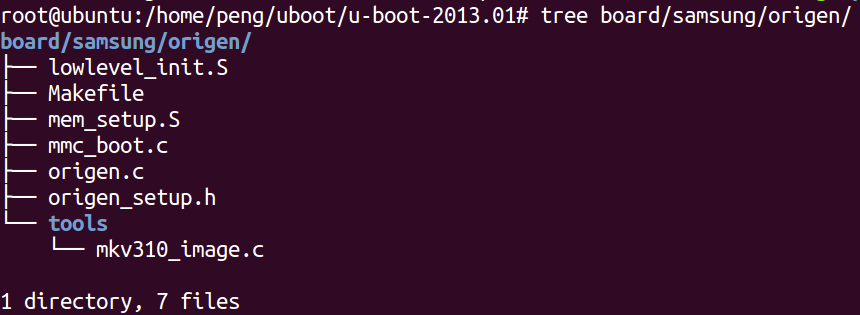
include/configs/origen.h
该文件定义了uboot启动必须关于exynos 4412必须的一些资源信息。
 和以前的老版本比,配置更加规范化了,其实这些就是相关文件分类的一个文件夹的描述。
和以前的老版本比,配置更加规范化了,其实这些就是相关文件分类的一个文件夹的描述。
依照这个层次关系,我们可以很方便的对我们开发板进行配置。
不同版本的uboot的配置命令可能是不同的,源码包的文件README通常会有相应的配置命令【其他版本的uboot会不一样】:

配置和编译命令如下:
$ make distclean
$ make origen_config
改配置命令会生成以下文件:
include/config.h
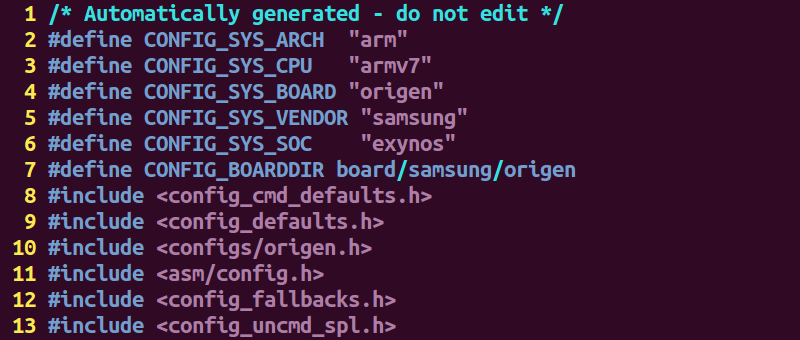
编译:
$ make all
编译完成后生成的u-boot.bin就是可执行的镜像文件。
但是并不会生成真正适配我们板子的uboot,只是适配参考板,该文件还不能在我们板子上运行,我们需要对u-boot源代码进行相应的修改。
在arch/arm/cpu/armv7/start.S 134 行后添加点灯程序
#if 1
ldr r0, =0x11000c40 @GPX2_7 led2
ldr r1, [r0]
bic r1, r1, #0xf0000000
orr r1, r1, #0x10000000
str r1, [r0]
ldr r0, =0x11000c44
mov r1,#0xff
str r1, [r0]
#endif
因为uboot刚启动的时候,串口没有来得及初始化,我们可以通过点亮LED的方法来判断程序是否执行到此处。
代码详解参考《十、LED汇编、C语言驱动编写》
exynos 需要三星提供的初始引导加密后,我们的u-boot,才能被引导运行,这其中要用到下面的几个命令或三星提供的工具软件,这些操作的目的就是根据三星的芯片的启动要求对uboot.bin 进行一些处理,包括在特定长度的位置加上和校验信息以及插入一些文件段。
$cp sdfuse_q u-boot-2013.01 -rf
$ chmod 777 u-boot-2013.01/sdfuse_q -R
$cp CodeSign4SecureBoot u-boot-2013.01 -rf
注:CodeSign4SecureBoot 三星提供的安全启动方式 ,对应的程序由三星提供。
sdfuse_q目录下的文件是针对三星堆uboot.bin文件格式要求进行加密编写的文件。
修改根目录Makefile,实现sdfuse_q的编译
在
$(obj)u-boot.bin: $(obj)u-boot
$(OBJCOPY) ${OBJCFLAGS} -O binary $< $@
$(BOARD_SIZE_CHECK)
下添加
@#./mkuboot
@split -b 14336 u-boot.bin bl2
@make -C sdfuse_q/
@#cp u-boot.bin u-boot-4212.bin
@#cp u-boot.bin u-boot-4412.bin
@#./sdfuse_q/add_sign
@./sdfuse_q/chksum
@./sdfuse_q/add_padding
@rm bl2a*
@echo
注意是tab键缩进的,否则makefile编译报错
注意如果执行了make distclean 需重新拷贝CodeSign4SecureBoot
为方便起见,在根目录下创建编译脚本build.sh,该脚本将自动完成添加加密方式。
1 #!/bin/sh
2
3 sec_path="CodeSign4SecureBoot/"
4 CPU_JOB_NUM=$(grep processor /proc/cpuinfo | awk ‘{field=$NF};END{print field+1}‘)
5 ROOT_DIR=$(pwd)
6 CUR_DIR=${ROOT_DIR##*/}
7
8 case "$1" in
9 clean)
10 echo make clean
11 make mrproper
12 ;;
13 *)
14
15 if [ ! -d $sec_path ]
16 then
17 echo "**********************************************"
18 echo "[ERR]please get the CodeSign4SecureBoot first"
19 echo "**********************************************"
20 return
21 fi
22
23 make origen_config
24
25 make -j$CPU_JOB_NUM
26
27 if [ ! -f checksum_bl2_14k.bin ]
28 then
29 echo "!!!!!!!!!!!!!!!!!!!!!!!!!!!!!!!!!!!!!!!!!!!!!!!!!!!!!!!!!!!!!!!!!!!!!!!!!!!!!!!"
30 echo "There are some error(s) while building uboot, please use command make to check."
31 echo "!!!!!!!!!!!!!!!!!!!!!!!!!!!!!!!!!!!!!!!!!!!!!!!!!!!!!!!!!!!!!!!!!!!!!!!!!!!!!!!"
32 exit 0
33 fi
34
35 cp -rf checksum_bl2_14k.bin $sec_path
36 cp -rf u-boot.bin $sec_path
37 rm checksum_bl2_14k.bin
38
39 cd $sec_path
40 cat E4412_N.bl1.SCP2G.bin bl2.bin all00_padding.bin u-boot.bin tzsw_SMDK4412_SCP_2GB.bin > u-boot-origen.bin
41 mv u-boot-origen.bin $ROOT_DIR
42
43 rm checksum_bl2_14k.bin
44 rm u-boot.bin
45
46 echo
47 echo
48 ;;
49
50 esac
编译脚本
$ chmod 777 u-boot-2013.01/ build.sh
$ ./buildsh
注:build.sh 脚本方式完成自动添加加密方式,
编译生成所需文件u-boot_origen.bin
root@ubuntu:/home/peng/uboot/u-boot-2013.01# ls
api config.mk examples Makefile sdfuse_q u-boot.bin
arch COPYING fs mkconfig snapshot.commit u-boot.map
board CREDITS helper.mk nand_spl spl u-boot-origen.bin
boards.cfg disk include net System.map u-boot.srec
build.sh doc lib post test
CodeSign4SecureBoot drivers MAINTAINERS README tools
common dts MAKEALL rules.mk u-boot

修改lowlevel_init.S文件
$vim board/samsung/origen/lowlevel_init.S
a) 添加临时栈,在
41 lowlevel_init:
后添加
ldr sp,=0x02060000 @use iRom stack in bl2
b) 添加关闭看门狗代码:
在
67 beq wakeup_reset
后添加
#if 1 /*for close watchdog */
/* PS-Hold high */
ldr r0, =0x1002330c
ldr r1, [r0]
orr r1, r1, #0x300
str r1, [r0]
ldr r0, =0x11000c08
ldr r1, =0x0
str r1, [r0]
/* Clear MASK_WDT_RESET_REQUEST */
ldr r0, =0x1002040c
ldr r1, =0x00
str r1, [r0]
#endif
c) 添加串口初始化代码:
在uart_asm_init: 的
351 str r1, [r0, #EXYNOS4_GPIO_A1_CON_OFFSET]
后添加
ldr r0, =0x10030000
ldr r1, =0x666666
ldr r2, =CLK_SRC_PERIL0_OFFSET
str r1, [r0, r2]
ldr r1, =0x777777
ldr r2, =CLK_DIV_PERIL0_OFFSET
str r1, [r0, r2]
d) 注释掉trustzone初始化
注释掉
104 bl uart_asm_init
下的代码:
#if 0
bl tzpc_init
#endif
因为各个厂家使用的网卡不尽相同,所以三星公司提供的驱动程序只预留了网卡初始化的函数入口,针对不同的板子,我们需要针对电路自己移植网卡的驱动。
网卡的驱动详解,我们会在后一章节详细讲解。
1、 添加网络初始化代码
$ vim board/samsung/origen/origen.c
在
31 struct exynos4_gpio_part2 *gpio2;
后添加:
#ifdef CONFIG_DRIVER_DM9000
#define EXYNOS4412_SROMC_BASE 0X12570000
#define DM9000_Tacs (0x1)
#define DM9000_Tcos (0x1)
#define DM9000_Tacc (0x5)
#define DM9000_Tcoh (0x1)
#define DM9000_Tah (0xC)
#define DM9000_Tacp (0x9)
#define DM9000_PMC (0x1)
struct exynos_sromc {
unsigned int bw;
unsigned int bc[6];
};
/*
* s5p_config_sromc() - select the proper SROMC Bank and configure the
* band width control and bank control registers
* srom_bank - SROM
* srom_bw_conf - SMC Band witdh reg configuration value
* srom_bc_conf - SMC Bank Control reg configuration value
*/
void exynos_config_sromc(u32 srom_bank, u32 srom_bw_conf, u32 srom_bc_conf)
{
unsigned int tmp;
struct exynos_sromc *srom = (struct exynos_sromc *)(EXYNOS4412_SROMC_BASE);
/* Configure SMC_BW register to handle proper SROMC bank */
tmp = srom->bw;
tmp &= ~(0xF << (srom_bank * 4));
tmp |= srom_bw_conf;
srom->bw = tmp;
/* Configure SMC_BC register */
srom->bc[srom_bank] = srom_bc_conf;
}
static void dm9000aep_pre_init(void)
{
unsigned int tmp;
unsigned char smc_bank_num = 1;
unsigned int smc_bw_conf=0;
unsigned int smc_bc_conf=0;
/* gpio configuration */
writel(0x00220020, 0x11000000 + 0x120);
writel(0x00002222, 0x11000000 + 0x140);
/* 16 Bit bus width */
writel(0x22222222, 0x11000000 + 0x180);
writel(0x0000FFFF, 0x11000000 + 0x188);
writel(0x22222222, 0x11000000 + 0x1C0);
writel(0x0000FFFF, 0x11000000 + 0x1C8);
writel(0x22222222, 0x11000000 + 0x1E0);
writel(0x0000FFFF, 0x11000000 + 0x1E8);
smc_bw_conf &= ~(0xf<<4);
smc_bw_conf |= (1<<7) | (1<<6) | (1<<5) | (1<<4);
smc_bc_conf = ((DM9000_Tacs << 28)
| (DM9000_Tcos << 24)
| (DM9000_Tacc << 16)
| (DM9000_Tcoh << 12)
| (DM9000_Tah << 8)
| (DM9000_Tacp << 4)
| (DM9000_PMC));
exynos_config_sromc(smc_bank_num,smc_bw_conf,smc_bc_conf);
}
#endif
在
gd->bd->bi_boot_params = (PHYS_SDRAM_1 + 0x100UL);
后添加
#ifdef CONFIG_DRIVER_DM9000
dm9000aep_pre_init();
#endif
在文件末尾添加
#ifdef CONFIG_CMD_NET
int board_eth_init(bd_t *bis)
{
int rc = 0;
#ifdef CONFIG_DRIVER_DM9000
rc = dm9000_initialize(bis);
#endif
return rc;
}
#endif
2、 修改配置文件添加网络相关配置
$ vim include/configs/origen.h
修改
85 #undef CONFIG_CMD_PING
为
#define CONFIG_CMD_PING
修改
90 #undef CONFIG_CMD_NET
为
#define CONFIG_CMD_NET
在文件末尾
#endif /* __CONFIG_H */
前面添加
#ifdef CONFIG_CMD_NET
#define CONFIG_NET_MULTI
#define CONFIG_DRIVER_DM9000 1
#define CONFIG_DM9000_BASE 0x05000000 //内存基地址
#define DM9000_IO CONFIG_DM9000_BASE
#define DM9000_DATA (CONFIG_DM9000_BASE + 4)
#define CONFIG_DM9000_USE_16BIT
#define CONFIG_DM9000_NO_SROM 1
#define CONFIG_ETHADDR 11:22:33:44:55:66
#define CONFIG_IPADDR 192.168.6.187
#define CONFIG_SERVERIP 192.168.6.186
#define CONFIG_GATEWAYIP 192.168.1.1
#define CONFIG_NETMASK 255.255.255.0
#endif
其中CONFIG_DM9000_BASE 地址为何是0x05000000,后续章节会详细分析。
cmd_mmc.c
cmd_mmc_fdisk.c
cmd_movi.c
mmc.c
mmc.h
movi.c
movi.h
s5p_mshc.c
s5p_mshc.h
这些文件,由三星提供。
添加相关驱动
cp movi.c arch/arm/cpu/armv7/exynos/
修改文件arch/arm/cpu/armv7/exynos/Makefile在pinmux.o 后添加movi.o
修改板级文件 board/samsung/origen/origen.c,在
#include <asm/arch/mmc.h>
后面添加
#include <asm/arch/clk.h>
#include "origen_setup.h"
在
#ifdef CONFIG_GENERIC_MMC
后面添加
u32 sclk_mmc4; /*clock source for emmc controller*/
#define __REGMY(x) (*((volatile u32 *)(x)))
#define CLK_SRC_FSYS __REGMY(EXYNOS4_CLOCK_BASE + CLK_SRC_FSYS_OFFSET)
#define CLK_DIV_FSYS3 __REGMY(EXYNOS4_CLOCK_BASE + CLK_DIV_FSYS3_OFFSET)
int emmc_init()
{
u32 tmp;
u32 clock;
u32 i;
/* setup_hsmmc_clock */
/* MMC4 clock src = SCLKMPLL */
tmp = CLK_SRC_FSYS & ~(0x000f0000);
CLK_SRC_FSYS = tmp | 0x00060000;
/* MMC4 clock div */
tmp = CLK_DIV_FSYS3 & ~(0x0000ff0f);
clock = get_pll_clk(MPLL)/1000000;
for(i=0 ; i<=0xf; i++) {
sclk_mmc4=(clock/(i+1));
if(sclk_mmc4 <= 160) //200
{
CLK_DIV_FSYS3 = tmp | (i<<0);
break;
}
}
emmcdbg("[mjdbg] sclk_mmc4:%d MHZ; mmc_ratio: %d\n",sclk_mmc4,i);
sclk_mmc4 *= 1000000;
/*
* MMC4 EMMC GPIO CONFIG
*
* GPK0[0] SD_4_CLK
* GPK0[1] SD_4_CMD
* GPK0[2] SD_4_CDn
* GPK0[3:6] SD_4_DATA[0:3]
*/
writel(readl(0x11000048)&~(0xf),0x11000048); //SD_4_CLK/SD_4_CMD pull-down enable
writel(readl(0x11000040)&~(0xff),0x11000040);//cdn set to be output
writel(readl(0x11000048)&~(3<<4),0x11000048); //cdn pull-down disable
writel(readl(0x11000044)&~(1<<2),0x11000044); //cdn output 0 to shutdown the emmc power
writel(readl(0x11000040)&~(0xf<<8)|(1<<8),0x11000040);//cdn set to be output
udelay(100*1000);
writel(readl(0x11000044)|(1<<2),0x11000044); //cdn output 1
writel(0x03333133, 0x11000040);
writel(0x00003FF0, 0x11000048);
writel(0x00002AAA, 0x1100004C);
#ifdef CONFIG_EMMC_8Bit
writel(0x04444000, 0x11000060);
writel(0x00003FC0, 0x11000068);
writel(0x00002AAA, 0x1100006C);
#endif
#ifdef USE_MMC4
smdk_s5p_mshc_init();
#endif
}
将 int board_mmc_init(bd_t *bis)函数内容改写为
int board_mmc_init(bd_t *bis)
{
int i, err;
#ifdef CONFIG_EMMC
err = emmc_init();
#endif
return err;
}
在末尾添加
#ifdef CONFIG_BOARD_LATE_INIT
#include <movi.h>
int chk_bootdev(void)//mj for boot device check
{
char run_cmd[100];
struct mmc *mmc;
int boot_dev = 0;
int cmp_off = 0x10;
ulong start_blk, blkcnt;
mmc = find_mmc_device(0);
if (mmc == NULL)
{
printf("There is no eMMC card, Booting device is SD card\n");
boot_dev = 1;
return boot_dev;
}
start_blk = (24*1024/MOVI_BLKSIZE);
blkcnt = 0x10;
sprintf(run_cmd,"emmc open 0");
run_command(run_cmd, 0);
sprintf(run_cmd,"mmc read 0 %lx %lx %lx",CFG_PHY_KERNEL_BASE,start_blk,blkcnt);
run_command(run_cmd, 0);
/* switch mmc to normal paritition */
sprintf(run_cmd,"emmc close 0");
run_command(run_cmd, 0);
return 0;
}
int board_late_init (void)
{
int boot_dev =0 ;
char boot_cmd[100];
boot_dev = chk_bootdev();
if(!boot_dev)
{
printf("\n\nChecking Boot Mode ... EMMC4.41\n");
}
return 0;
}
#endif
添加相关命令
$ cp cmd_movi.c common/
$ cp cmd_mmc.c common/
$ cp cmd_mmc_fdisk.c common/
修改common/Makefile
在
COBJS-$(CONFIG_CMD_MMC) += cmd_mmc.o
后添加
COBJS-$(CONFIG_CMD_MMC) += cmd_mmc_fdisk.o
COBJS-$(CONFIG_CMD_MOVINAND) += cmd_movi.o
添加驱动
$ cp mmc.c drivers/mmc/
$ cp s5p_mshc.c drivers/mmc/
$ cp mmc.h include/
$ cp movi.h include/
$ cp s5p_mshc.h include/
修改Makefile
$vim drivers/mmc/Makefile
添加
COBJS-$(CONFIG_S5P_MSHC) += s5p_mshc.o
添加EMMC相关配置
$vim include/configs/origen.h
添加
#define CONFIG_EVT1 1 /* EVT1 */
#ifdef CONFIG_EVT1
#define CONFIG_EMMC44_CH4 //eMMC44_CH4 (OMPIN[5:1] = 4)
#ifdef CONFIG_SDMMC_CH2
#define CONFIG_S3C_HSMMC
#undef DEBUG_S3C_HSMMC
#define USE_MMC2
#endif
#ifdef CONFIG_EMMC44_CH4
#define CONFIG_S5P_MSHC
#define CONFIG_EMMC 1
#define USE_MMC4
/* #define CONFIG_EMMC_8Bit */
#define CONFIG_EMMC_EMERGENCY
/*#define emmcdbg(fmt,args...) printf(fmt ,##args) *///for emmc debug
#define emmcdbg(fmt,args...)
#endif
#endif /*end CONFIG_EVT1*/
#define CONFIG_CMD_MOVINAND
#define CONFIG_CLK_1000_400_200
#define CFG_PHY_UBOOT_BASE CONFIG_SYS_SDRAM_BASE + 0x3e00000
#define CFG_PHY_KERNEL_BASE CONFIG_SYS_SDRAM_BASE + 0x8000
#define BOOT_MMCSD 0x3
#define BOOT_EMMC43 0x6
#define BOOT_EMMC441 0x7
#define CONFIG_BOARD_LATE_INIT
修改顶层Makefile,注释掉spl的编译:
623 #$(obj)spl/u-boot-spl.bin: $(SUBDIR_TOOLS) depend
624 # $(MAKE) -C spl all
重新编译uboot:
$ ./build.sh
在根目录下会生成bin文件u-boot-origen.bin。
三星公司已经给我们提供了制作SD卡启动的烧写的脚本:
mkuboot.sh
#!/bin/bash
#
# This script will create a u-boot binary for movinand/mmc boot
#
echo "Fuse FS4412 trustzone uboot file into SD card"
if [ -z $1 ] #判断参数1的字符串是否为空,如果为空,则打印出帮助信息
then
./sd_fusing_exynos4x12.sh /dev/sdb u-boot-origen.bin
else
./sd_fusing_exynos4x12.sh $1 u-boot-origen.bin
fi
sd_fusing_exynos4x12.sh
1 #!/bin/sh
2 #
3 # Copyright (C) 2010 Samsung Electronics Co., Ltd.
4 # http://www.samsung.com/
5 #
6 # This program is free software; you can redistribute it and/or modify
7 # it under the terms of the GNU General Public License version 2 as
8 # published by the Free Software Foundation.
9 #
10 ####################################
11 reader_type1="/dev/sd"
12 reader_type2="/dev/mmcblk0"
13
14 if [ -z $2 ] #判断参数2的字符串是否为空,如果为空,则打印出帮助信息
15 then
16 echo "usage: ./sd_fusing.sh <SD Reader‘s device file> <filename>"
17 exit 0
18 fi
19
20 param1=`echo "$1" | awk ‘{print substr($1,1,7)}‘`
21
22 if [ "$param1" = "$reader_type1" ]
23 then
24 partition1=$1"1"
25 partition2=$1"2"
26 partition3=$1"3"
27 partition4=$1"4"
28
29 elif [ "$1" = "$reader_type2" ]
30 then
31 partition1=$1"p1"
32 partition2=$1"p2"
33 partition3=$1"p3"
34 partition4=$1"p4"
35
36 else
37 echo "Unsupported SD reader"
38 exit 0
39 fi
40
41 if [ -b $1 ] #判断参数1所指向的设备节点是否存在
42 then
43 echo "$1 reader is identified."
44 else
45 echo "$1 is NOT identified."
46 exit 0
47 fi
48
49 ####################################
50 # format
51 umount $partition1 2> /dev/null
52 umount $partition2 2> /dev/null
53 umount $partition3 2> /dev/null
54 umount $partition4 2> /dev/null
55
56 echo "$2 fusing..."
# 烧写u-boot-origen.bin到SD卡(512+8K)字节处, 512+8K=17x512,即第17个block
57 dd iflag=dsync oflag=dsync if=$2 of=$1 seek=1 && 58 echo "$2 image has been fused successfully."
59
60 #echo "zImage fusing..."
61 #dd iflag=dsync oflag=dsync if=../../TC4_Kernel_3.0/arch/arm/boot/zImage of=$1 seek=1024 && 62 # echo "zImage has been fused successfully."
63
64 #echo "ramdisk-uboot.img fusing..."
65 #dd iflag=dsync oflag=dsync if=../../TC4_GB_2.3.4/out/target/product/smdk4212/ramdisk-uboot.img of=$1 seek=9216 && 66 # echo "ramdisk-uboot.img has been fused successfully."
67
68 ####################################
69 #<Message Display>
70 echo "Eject SD card"
71
a) 创建文件mkuboot.sh、sd_fusing_exynos4x12.sh
b) 将SD卡插入电脑并被ubuntu识别
c) 拷贝编译好u-boot-origen.bin拷贝到当前目录下
root@ubuntu:/home/peng/uboot/sdfuse_q# ls
mkuboot.sh sd_fusing_exynos4x12.sh u-boot-origen.bin
d) 进入sdfuse_q执行如下操作
root@ubuntu:/home/peng/uboot/sdfuse_q#./mkuboot.sh /dev/sdb

d) 在SD卡中创建目录sdupdate,并把编译好的uboot镜像文件u-boot-origen.bin拷贝到这个目录。
a) 连接串口和板子,运行串口通信程序putty
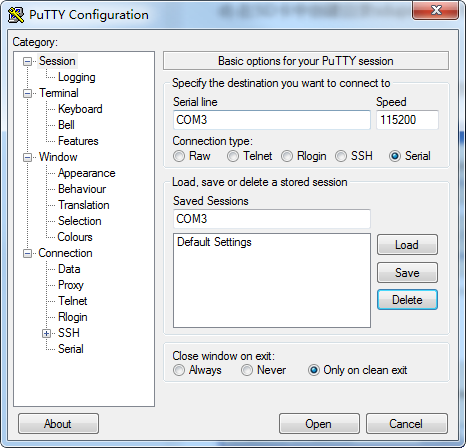
选择右上角的”Serial”,然后点击左下角的”Serial”
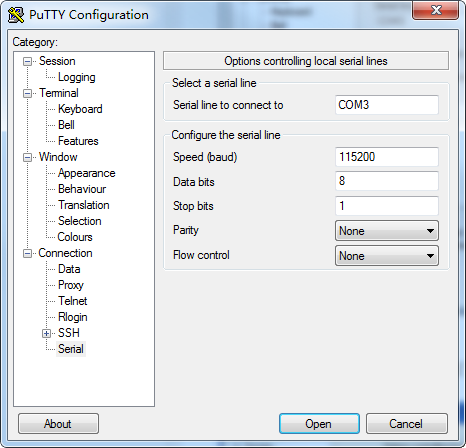
按照自己的主机的情况选择COM口其他必须一直,然后点击open打开串口
b) 关闭开发板电源,将拨码开关SW1调至(1000)(SD启动模式)后打开电源
c) 将刚才做好的SD启动盘插入SD卡插槽
d) 重新打开开发板能够看到如下界面
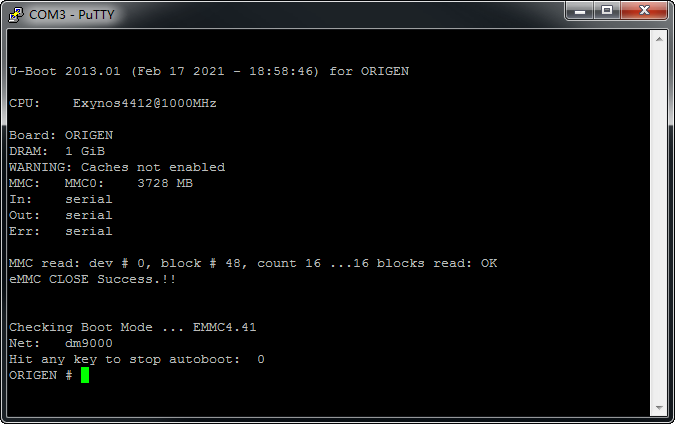
在读秒倒计时时按任意键。
由上图所示,已经支持EMMC和dm9000网卡。
e) 烧写
在终端上执行
sdfuse flashall
注意:上面的命令把SD卡 sdupdate目录下的u-boot-origen.bin烧写到emmc起始位置
等待终端无输出是表示烧写结束
f) 关闭开发板电源,将拨码开关SW1调至0110(EMMC启动模式)后打开电源即可以从emmc启动
如果板子已经可以启动uboot,我们也可以通过网络烧写uboot。
步骤如下:
movi write u-boot 41000000
若编译后的u-boot-origen.bin 无法运行,可参考上一节,重新从SD卡引导烧写。
标签:mpi ctr scl device 要求 update conf bis pll
原文地址:https://www.cnblogs.com/yikoulinux/p/14682948.html